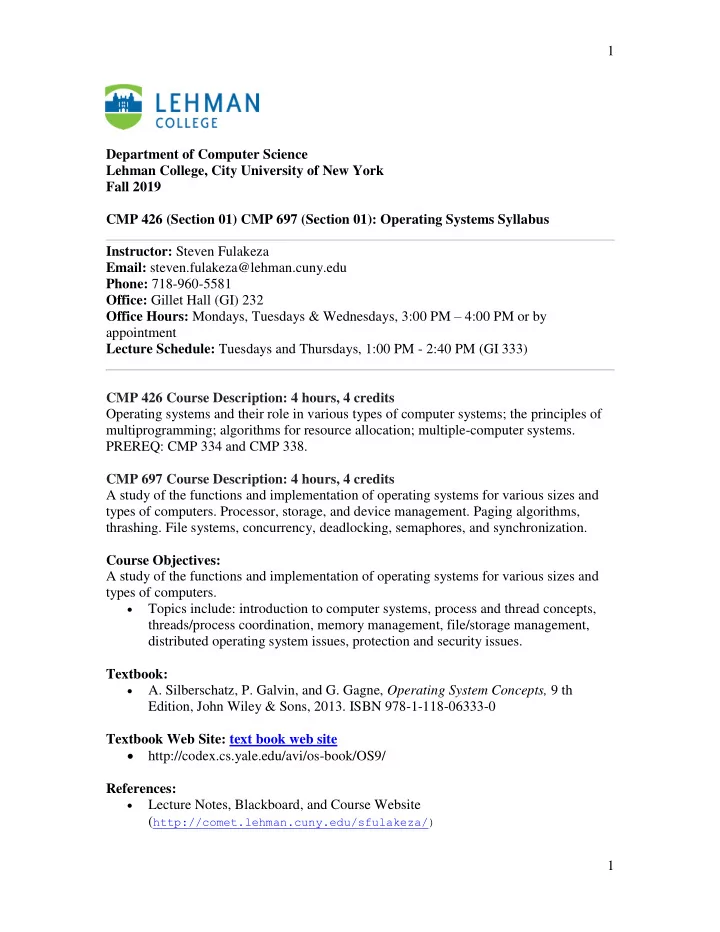

1 Department of Computer Science Lehman College, City University of New York Fall 2019 CMP 426 (Section 01) CMP 697 (Section 01): Operating Systems Syllabus Instructor: Steven Fulakeza Email: steven.fulakeza@lehman.cuny.edu Phone: 718-960-5581 Office: Gillet Hall (GI) 232 Office Hours: Mondays, Tuesdays & Wednesdays, 3:00 PM – 4:00 PM or by appointment Lecture Schedule: Tuesdays and Thursdays, 1:00 PM - 2:40 PM (GI 333) CMP 426 Course Description: 4 hours, 4 credits Operating systems and their role in various types of computer systems; the principles of multiprogramming; algorithms for resource allocation; multiple-computer systems. PREREQ: CMP 334 and CMP 338. CMP 697 Course Description: 4 hours, 4 credits A study of the functions and implementation of operating systems for various sizes and types of computers. Processor, storage, and device management. Paging algorithms, thrashing. File systems, concurrency, deadlocking, semaphores, and synchronization. Course Objectives: A study of the functions and implementation of operating systems for various sizes and types of computers. Topics include: introduction to computer systems, process and thread concepts, threads/process coordination, memory management, file/storage management, distributed operating system issues, protection and security issues. Textbook: A. Silberschatz, P. Galvin, and G. Gagne, Operating System Concepts, 9 th Edition, John Wiley & Sons, 2013. ISBN 978-1-118-06333-0 Textbook Web Site: text book web site http://codex.cs.yale.edu/avi/os-book/OS9/ References: Lecture Notes, Blackboard, and Course Website ( http://comet.lehman.cuny.edu/sfulakeza/) 1
2 Grade Policy: Homework Assignments: 40% Midterm Exam: 30% Final Exam: 30% for undergraduate students, 20% for graduate students Graduate students research paper: 10% Exam Schedule: Midterm Exam: Thursday, October 24 th , 2019 1:00 PM – 2:40 PM Final Exam: Thursday, December 19 th , 2019 1:30 PM – 3:30 PM The final exam is comprehensive. There are no make-up exams. However, makeup exam might be given only if a student's absence is unavoidable. In such a case, the student must file formal written request. Homework Assignments Several homework assignments are given during lectures. Students need to work on the homework for preparing for exams but may not need to submit the homework assignments to the instructor. Some selected homework problems will be assigned as formal assignments to be submitted for grading. Students must work on their own assignments unless we state otherwise. No late assignments will be accepted. Homework assignments will include the following areas and more: Process creations/executions based on Linux/UNIX API and Win API Message based communications based on Linux/UNIX API Shared memory-based communications between processes based on Linux/UNIX API and WIN API Multithreading based on POSIX API, Win API, Java threads Java nexus IO (memory mapped IO), Windows memory mapped IO Synchronization based on UNIX System V API, POSIX API, Win API Linux kernel module programming/driver programming Graduate Students Research Paper - For Graduate Students Only (CMP 697) : Research Paper (10 - 15 pages double-spaced in 12 fonts, Times Roman) in various contemporary research areas such as: Threading issues in Linux kernels, Fast mutual exclusions, Virtualization and cloud computing, File systems in solid state devices, In-memory file systems, In memory DBMS; Some details about research paper writing and presentation will be discussed during office hours. 2
3 Research Paper Proposal Due: November 12, 2019 (2-3 pages of extended abstract with at least 5 academic research papers as references) Honor Code: Students are encouraged to study together. However, you must do your own work for all your homework assignments, projects and exams. You should never copy code or work from the internet or another student. You are responsible for knowing and following Lehman's academic integrity code (available from the Undergraduate Bulletin, Graduate Bulletin, or the Office of Academic Standards and Evaluations). https://www.lehman.edu/student-affairs/documents/Final-Student-Handbook-Lehman- College-9-19-18.pdf Note: All incidents of cheating will be reported to the Vice President of Student Affairs. Attendance Students are expected to attend lectures and labs regularly and promptly. In the event of illness, or injury, students should notify me. Students who miss a class are responsible for learning materials presented in class and reading relevant textbook portions. If you need help, please do not hesitate to contact me or come to my office hours. Technology, Blackboard and Email We will be using a Blackboard for much of the class activities. It can be accessed through the Lehman website at www.lehman.cuny.edu. You will also need to have access to your Blackboard account. You can contact the IT Center if you have any problems accessing your account. We will be communication with you regularly throughout the semester using your email address that is available on Blackboard. Make sure you have access to your email. If you have, any questions about your Lehman email address or your password, or if you have any problems accessing the site please call the computer helpdesk at 718-960-1111. Accommodating Disabilities Lehman College is committed to providing access to all programs and curricula to all students. Students with disabilities who may need classroom accommodations are encouraged to register with the Office of Student Disability Services. For more information, please contact the Office of Student Disability Services in Shuster Hall, Room 238, phone number, 718-960-8441. Course Outline: Overview Chapter 1: An Overview of Operating Systems Chapter 2: Computer System and OS Structures Process management Chapter 3: Process Concept Chapter 4: Threads 3
4 Chapter 5: Process & Threads Synchronization Chapter 6: CPU Scheduling Chapter 7: Deadlocks Memory and Storage Management Chapter 8: Memory Management Chapter 9: Virtual Memory Chapter 10: Mass-storage Structure Chapter 11: File System Interface Chapter 12: File System Implementation Protection & Security Chapter 14: Protection Chapter 15: Security 4
Recommend
More recommend